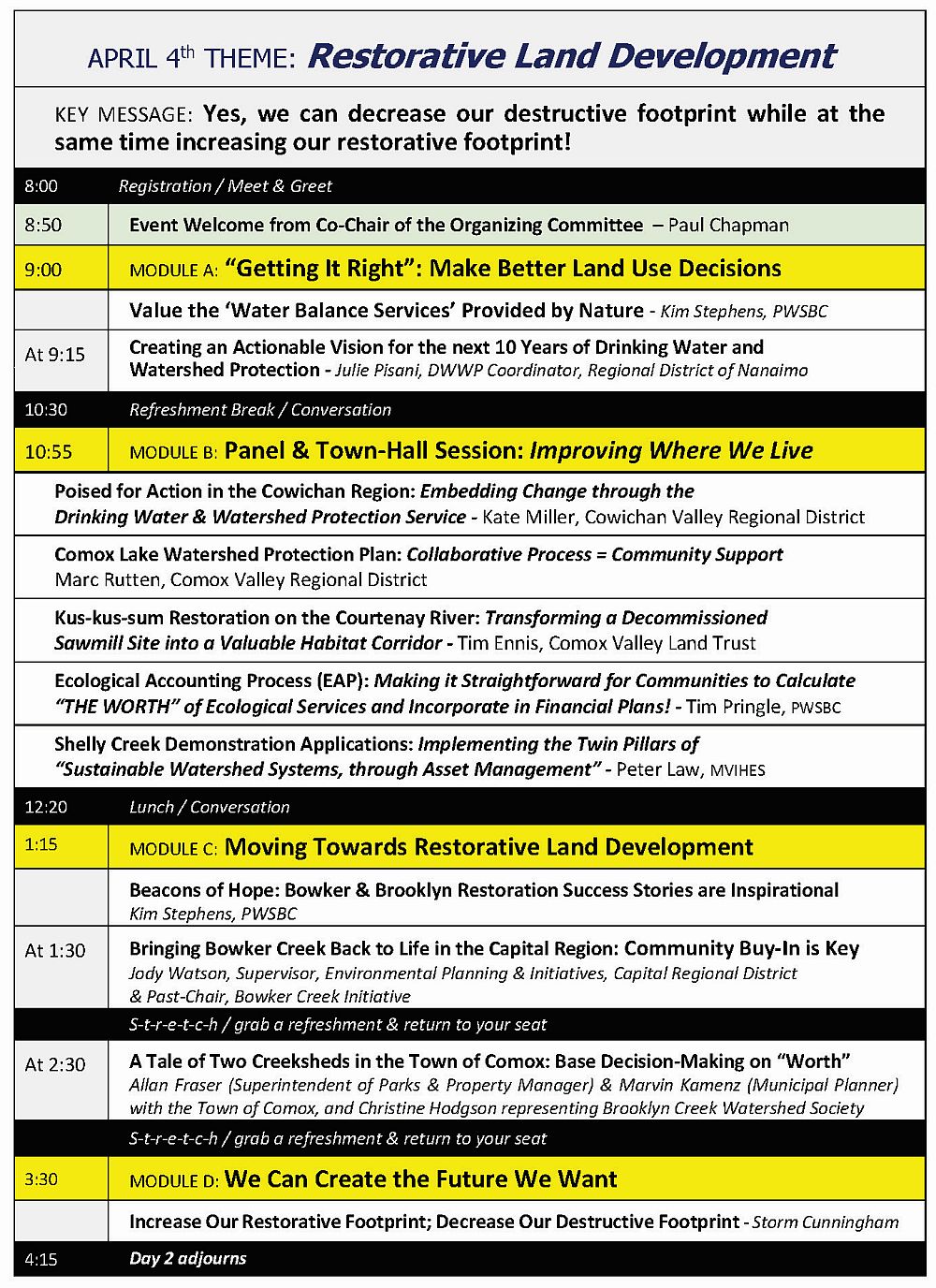WATCH THE PARKSVILLE WATER STEWARDSHIP SYMPOSIUM ON YOUTUBE: a set of nine videos provide a record of what was shared when close to 200 delegates convened to celebrate success stories, and learn from those who are “improving where we live through restorative development” (April 2019)
NOTE TO READER:
The City of Parksville was the setting for the second in the annual Vancouver Island symposium series on water stewardship in a changing climate. Close to 200 delegates attended this 3-day event. They came from far and wide – from Sooke north to Port McNeil; from Metro Vancouver east to Alberta; and from south of the border (Washington State, Virginia and Mississippi).
Parksville 2019 comprised a field day followed by a 2-day symposium. The over-arching theme was Improving Where We Live Through Restorative Development. The headliner was Storm Cunningham, author of The Restoration Economy and two other books on how to decrease our destructive footprint while at the same time increasing our restorative footprint.
The Parksville 2019 Symposium has been captured in its entirety in a set of nine videos that have been uploaded to YouTube for ease of access by those who are curious and/or interested to learn about what transpired on April 2-3-4 in Parksville, British Columbia. Or simply refresh their memories. Scroll down, click on the links, and enjoy!

View the Symposium Legacy Videos on YouTube!
A vision for restorative development that revitalizes watershed function and health provided a philosophical backdrop for the Parksville Water Stewardship Symposium, the second in an annual series.
 The term ‘restorative development’ was coined by the writer Storm Cunningham in his first book The Restoration Economy, published in 2002. It was the first book to document the new disciplines and fast-growing industries that are renewing our natural, built, and socioeconomic environments.
The term ‘restorative development’ was coined by the writer Storm Cunningham in his first book The Restoration Economy, published in 2002. It was the first book to document the new disciplines and fast-growing industries that are renewing our natural, built, and socioeconomic environments.
The Symposium provided a platform for a call for action because adapting to climate change requires transformation in how we value nature and service land. An informed stewardship sector can be a catalyst for action on Vancouver Island and beyond, through collaboration with local government.
Decrease our destructive footprint while increasing our restorative footprint!
“The goal of making the world ‘less worse’ does not go far enough. Rather, we have it within our power to undo previous damage and make the world better. The process of restoring our planet and revitalizing our communities is becoming a rigorous discipline, with the proper education and tools,” stated Storm Cunningham.
“The first step is to create an ongoing revitalization (or resilience) program, which constantly initiates, perpetuates, evaluates and adjusts local renewal efforts. The first job of that program is to facilitate a shared vision for the future. The second step is to create a strategy to implement that vision. Next, it’s best to do some policy work, adding policies to support that strategy, and removing policies that undermine it.”

Day One – Sustainable Stream Restoration
On Day One, the key message was reconnect hydrology and ecology – because what happens on the land in the creekshed matters to streams!
MODULE A – “Getting It Right: The Whole-System Approach
MODULE B – Panel & Town-Hall Session: Watershed Health and You
MODULE C – Make Better Decisions: First, Understand How Rain Reaches a Stream
MODULE D – Back to the Future: Reconnect Hydrology and Ecology
PUBLIC LECTURE BY STORM CUNNINGHAM – Nature is Regenerative. We Should Be Too

Day Two – Restorative Land Development
On Day Two, the key message was that we can indeed decrease our destructive footprint while at the same time increasing our restorative footprint.
MODULE A – “Getting It Right: Make Better Land Use Decisions
MODULE B – Panel & Town-Hall Session: Improve Where We Live
MODULE C – Moving Towards Restorative Land Development
MODULE D – We Can Create the Future We Want


